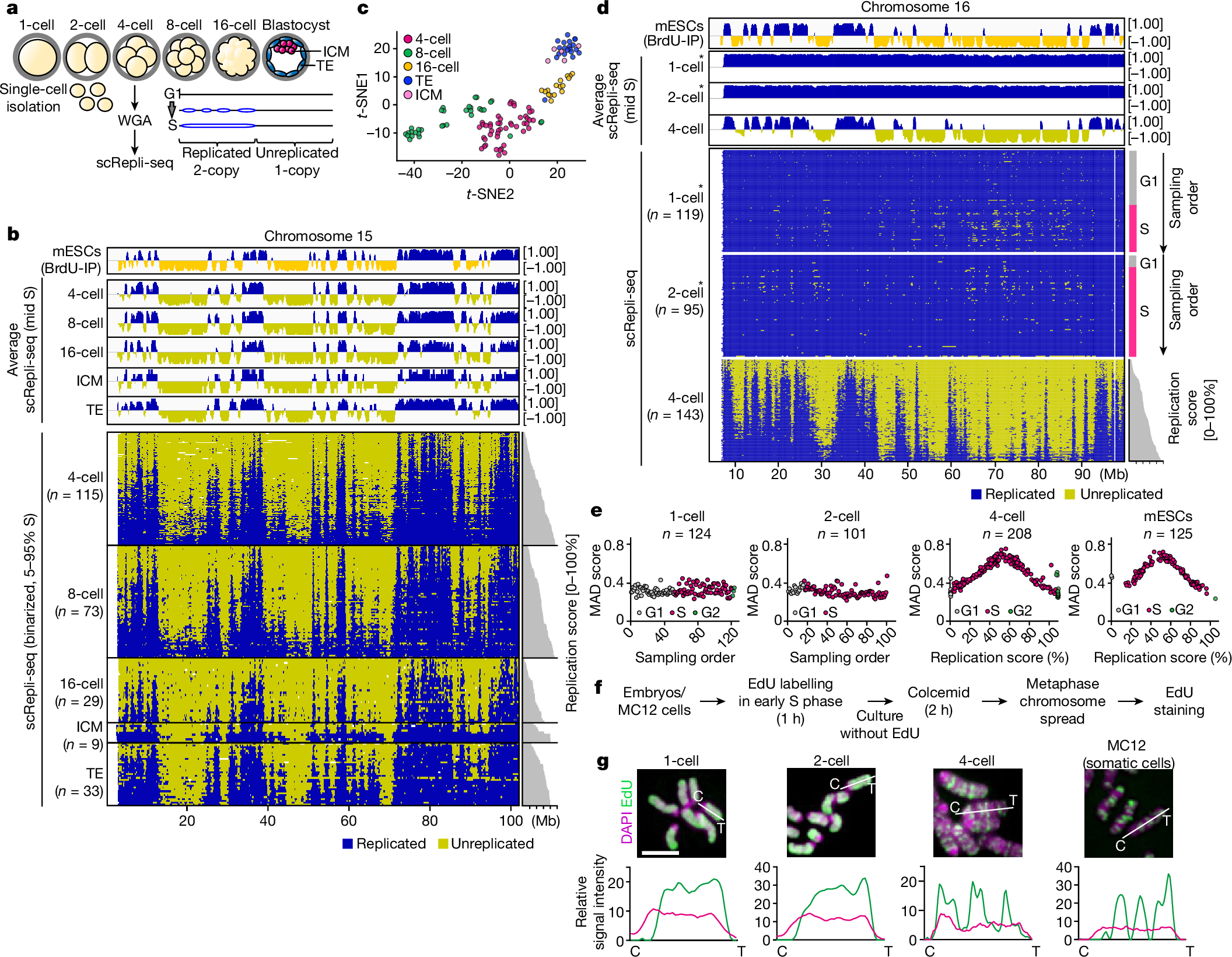doi.org/10.1038/s41586-024-07841-y
Preview meta tags from the doi.org website.
Linked Hostnames
31- 253 links todoi.org
- 121 links towww.ncbi.nlm.nih.gov
- 68 links toscholar.google.com
- 24 links towww.nature.com
- 11 links toadsabs.harvard.edu
- 9 links toscholar.google.co.uk
- 7 links towww.springernature.com
- 5 links toorcid.org
Thumbnail

Search Engine Appearance
Embryonic genome instability upon DNA replication timing program emergence - Nature
Faithful DNA replication is essential for genome integrity1–4. Under-replicated DNA leads to defects in chromosome segregation, which are common during embryogenesis5–8. However, the regulation of DNA replication remains poorly understood in early mammalian embryos. Here we constructed a single-cell genome-wide DNA replication atlas of pre-implantation mouse embryos and identified an abrupt replication program switch accompanied by a transient period of genomic instability. In 1- and 2-cell embryos, we observed the complete absence of a replication timing program, and the entire genome replicated gradually and uniformly using extremely slow-moving replication forks. In 4-cell embryos, a somatic-cell-like replication timing program commenced abruptly. However, the fork speed was still slow, S phase was extended, and markers of replication stress, DNA damage and repair increased. This was followed by an increase in break-type chromosome segregation errors specifically during the 4-to-8-cell division with breakpoints enriched in late-replicating regions. These errors were rescued by nucleoside supplementation, which accelerated fork speed and reduced the replication stress. By the 8-cell stage, forks gained speed, S phase was no longer extended and chromosome aberrations decreased. Thus, a transient period of genomic instability exists during normal mouse development, preceded by an S phase lacking coordination between replisome-level regulation and megabase-scale replication timing regulation, implicating a link between their coordination and genome stability. A single-cell genome-wide DNA replication atlas of pre-implantation mouse embryos reveals an abrupt replication program switch accompanied by a transient period of genomic instability.
Bing
Embryonic genome instability upon DNA replication timing program emergence - Nature
Faithful DNA replication is essential for genome integrity1–4. Under-replicated DNA leads to defects in chromosome segregation, which are common during embryogenesis5–8. However, the regulation of DNA replication remains poorly understood in early mammalian embryos. Here we constructed a single-cell genome-wide DNA replication atlas of pre-implantation mouse embryos and identified an abrupt replication program switch accompanied by a transient period of genomic instability. In 1- and 2-cell embryos, we observed the complete absence of a replication timing program, and the entire genome replicated gradually and uniformly using extremely slow-moving replication forks. In 4-cell embryos, a somatic-cell-like replication timing program commenced abruptly. However, the fork speed was still slow, S phase was extended, and markers of replication stress, DNA damage and repair increased. This was followed by an increase in break-type chromosome segregation errors specifically during the 4-to-8-cell division with breakpoints enriched in late-replicating regions. These errors were rescued by nucleoside supplementation, which accelerated fork speed and reduced the replication stress. By the 8-cell stage, forks gained speed, S phase was no longer extended and chromosome aberrations decreased. Thus, a transient period of genomic instability exists during normal mouse development, preceded by an S phase lacking coordination between replisome-level regulation and megabase-scale replication timing regulation, implicating a link between their coordination and genome stability. A single-cell genome-wide DNA replication atlas of pre-implantation mouse embryos reveals an abrupt replication program switch accompanied by a transient period of genomic instability.
DuckDuckGo
Embryonic genome instability upon DNA replication timing program emergence - Nature
Faithful DNA replication is essential for genome integrity1–4. Under-replicated DNA leads to defects in chromosome segregation, which are common during embryogenesis5–8. However, the regulation of DNA replication remains poorly understood in early mammalian embryos. Here we constructed a single-cell genome-wide DNA replication atlas of pre-implantation mouse embryos and identified an abrupt replication program switch accompanied by a transient period of genomic instability. In 1- and 2-cell embryos, we observed the complete absence of a replication timing program, and the entire genome replicated gradually and uniformly using extremely slow-moving replication forks. In 4-cell embryos, a somatic-cell-like replication timing program commenced abruptly. However, the fork speed was still slow, S phase was extended, and markers of replication stress, DNA damage and repair increased. This was followed by an increase in break-type chromosome segregation errors specifically during the 4-to-8-cell division with breakpoints enriched in late-replicating regions. These errors were rescued by nucleoside supplementation, which accelerated fork speed and reduced the replication stress. By the 8-cell stage, forks gained speed, S phase was no longer extended and chromosome aberrations decreased. Thus, a transient period of genomic instability exists during normal mouse development, preceded by an S phase lacking coordination between replisome-level regulation and megabase-scale replication timing regulation, implicating a link between their coordination and genome stability. A single-cell genome-wide DNA replication atlas of pre-implantation mouse embryos reveals an abrupt replication program switch accompanied by a transient period of genomic instability.
General Meta Tags
159- titleEmbryonic genome instability upon DNA replication timing program emergence | Nature
- titleClose banner
- titleClose banner
- X-UA-CompatibleIE=edge
- applicable-devicepc,mobile
Open Graph Meta Tags
6- og:urlhttps://www.nature.com/articles/s41586-024-07841-y
- og:typearticle
- og:site_nameNature
- og:titleEmbryonic genome instability upon DNA replication timing program emergence - Nature
- og:descriptionA single-cell genome-wide DNA replication atlas of pre-implantation mouse embryos reveals an abrupt replication program switch accompanied by a transient period of genomic instability.
Twitter Meta Tags
6- twitter:site@nature
- twitter:cardsummary_large_image
- twitter:image:altContent cover image
- twitter:titleEmbryonic genome instability upon DNA replication timing program emergence
- twitter:descriptionNature - A single-cell genome-wide DNA replication atlas of pre-implantation mouse embryos reveals an abrupt replication program switch accompanied by a transient period of genomic instability.
Item Prop Meta Tags
4- position1
- position2
- position3
- publisherSpringer Nature
Link Tags
15- alternatehttps://www.nature.com/nature.rss
- apple-touch-icon/static/images/favicons/nature/apple-touch-icon-f39cb19454.png
- canonicalhttps://www.nature.com/articles/s41586-024-07841-y
- icon/static/images/favicons/nature/favicon-48x48-b52890008c.png
- icon/static/images/favicons/nature/favicon-32x32-3fe59ece92.png
Emails
3Links
532- http://adsabs.harvard.edu/cgi-bin/nph-data_query?link_type=ABSTRACT&bibcode=1995Sci...270..994H
- http://adsabs.harvard.edu/cgi-bin/nph-data_query?link_type=ABSTRACT&bibcode=2001Sci...294...96G
- http://adsabs.harvard.edu/cgi-bin/nph-data_query?link_type=ABSTRACT&bibcode=2016NatSR...619636K
- http://adsabs.harvard.edu/cgi-bin/nph-data_query?link_type=ABSTRACT&bibcode=2017NatSR...7.9744O
- http://adsabs.harvard.edu/cgi-bin/nph-data_query?link_type=ABSTRACT&bibcode=2017Natur.544..110F